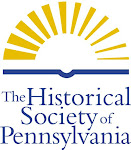

Creating custom enclosures for books and papers is necessary from a conservation and preservation standpoint. Enclosures are made in a variety of ways, specific to the needs of the collection material using chemically stable materials. Housing collection materials in a box or wrapper helps to provide protection from the threat of any environemental issues (such as dust, light, or moisture) and eases stress on a book as it is moved on and off a shelf.
Multi-Use Boxes are constructed of corrugated acid-free blue board to the specific measurements of the material. The box opens like a clamshell and is made to be able to sit upright on a shelf like a book.


Compartments can be created for odd-sized objects or multiple items.




For special items, a cloth-covered Clamshell Box is constructed. Clam-shell boxes provide the same protection as a multi-use box, but allow for a much nicer presentation. Intern Ansley Joe created this clamshell box for a leather journal/case belonging to Elizabeth B. Chew.


Multi-Use Boxes are constructed of corrugated acid-free blue board to the specific measurements of the material. The box opens like a clamshell and is made to be able to sit upright on a shelf like a book.


Compartments can be created for odd-sized objects or multiple items.




For special items, a cloth-covered Clamshell Box is constructed. Clam-shell boxes provide the same protection as a multi-use box, but allow for a much nicer presentation. Intern Ansley Joe created this clamshell box for a leather journal/case belonging to Elizabeth B. Chew.



Inset Boxes are created for items that need to be housed together or for smaller books. The boxes are constructed of a heavy-weight (20-pt. thickness) acid-free library board, with flaps to close over the inset portion. The box is then inserted into a custom-made slipcase.
The book is easily lifted out of its compartment by a piece of cotton tape attached to a flap of 20-pt.
Other enclosures performed on materials in the Chew Papers Collection are Wrappers. This approach is best for books or pamphlets that are too thin to create a multi-use box for, but require protective housing.








